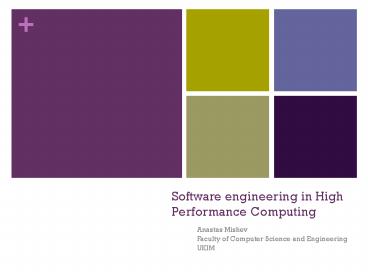Software engineering in High Performance Computing - PowerPoint PPT Presentation
Title:
Software engineering in High Performance Computing
Description:
Software engineering in High Performance Computing Anastas Mishev Faculty of Computer Science and Engineering UKIM + + + + + Pan-European HPC ecosystem The HP-SEE ... – PowerPoint PPT presentation
Number of Views:86
Avg rating:3.0/5.0
Title: Software engineering in High Performance Computing
1
Software engineering in High Performance Computing
- Anastas Mishev
- Faculty of Computer Science and Engineering
- UKIM
2
Agenda
- HPC
- HPC Developers
- Problems
- Testing HPC software
- The HP-SEE project
- Applications overview
- Further work
- Conclusion
3
HPC
- Usage of advanced computing systems (aka
supercomputers ) in solving complex computing
problems - It includes
- Infrastructure
- Architectures
- Interconnection
- Operating systems
- Middleware
- Parallel programming
- Languages
- Algorithms
4
HPC Developers
- Majority of the developers are not computer
scientists or engineers - Their primary goal computational science
- Achieving scientific results in their field of
research using computers - Almost all of them lack formal software
engineering knowledge
5
HPC developers from SE perspective
- Teams
- Individual developers
- Large, distributed groups
- Code lifetime (development/usage ratio)
- Short
- Long
- Users
- Developers
- Community users
6
Some thoughts
- Their goal is to do science, not execute
programs - FLOPS are not measure of science achieved
- The results are measured not on the program
performance, but on the scientific output
achieved - Writing codes that perform efficiently on HPC
systems is a means to an end, not an end to
itself - Not always ready to sacrifice to increase program
performance, especially if it means
maintainability problems.
7
Technologies
- Skepticism for new technologies
- Key to success co-existence of the new and old
technologies - Shared resources and problems
- Batch queues make the debugging hard
- Remote access even more
8
SE vs. HPC
- Mismatches
- OO vs. FORTRAN
- Frameworks
- IDE
- How to help
- Educate
- Disseminate best practices
- Reuse
9
Testing
- Different
- Often try to optimize the methods, not the
programs - Validation
- Compare to experimental results, where possible
- Some deeper research
- Try to provide more help to the computational
scientist - The environment HP-SEE community
10
HP-SEE
- Contract n RI-261499
- Project type CP CSA
- Call INFRA-2010-1.2.3 VRCs
- Start date 01/09/2010
- Duration 33 months
- Total budget 3 885 196
- Funding from the EC 2 100 000
- Total funded effort, PMs 539.5
- Web site www.hp-see.eu
11
Partners
Participant Organization name Short Name Country
Greek Research Technology Network GRNET GR
nstitute of Information and Communication Technologies, Bulgarian Academy of Sciences IICTP-BAS BG
"Horia Hulubei" National Institute of Research and Development for Physics and Nuclear Engineering IFIN-HH RO
Turkish Academic Network Information Centre TÜBITAK-ULAKBIM TR
National Information Infrastructure Development Institute NIIF HU
Institute of Physics Belgrade IPB RS
Polytechnic University of Tirana PuoT AL
University of Banja Luka UoBL ETF BA
SS. Cyril Methodius University of Skopje UKIM MK
University of Montenegro UOM ME
Research Educational Networking Association of Moldova RENAM MD
Institute for Informatics Automation Problems, National Academy of Sciences of Armenia IIAP-NAS-RA AM
Georgian Research Educational Networking Association GRENA GE
Azerbaijan Research and Education Association AZRENA AZ
12
SEE HPC Infrastructure - Current and Near Future
- Main current facility
- IBM Blue Gene/P two racks8192 cores
- Theoretical peak performance Rpeak 27.85
Tflops - Energy efficiency 371.67 MFlops/W Green top 10
- Smaller HPC installations in Serbia, Romania,
Hungary, Bulgaria - Hungary recently procured a distributed HPC
infrastructure 30Tflops - Romania to procure a BlueGene/P machine
- Macedonia has concrete plans for procurement soon
(September 2011) - Upcoming procurements in Serbia and Greece
13
HP-SEE Virtual Research Communities
- Comp. Physics
- 6 countries,
- 8 apps.
- Comp. Chemistry
- 6 countries,
- 7 apps.
- Life Sciences
- 5 countries,
- 7 apps.
HPC National Policy Training Sofia, Bulgaria,
17 May 2011 13
14
How?
- Surveys
- Dissemination
- Best practices
- But most importantly, education
- Special courses
- Courses for computational scientists
15
Conclusion
- SE and HPC are not always aligned
- Computer scientist need to understand the
problems of the computational scientist - Computational scientists should trust more
computer scientists - Education is critical
16
Thank you for your attention
- Questions































